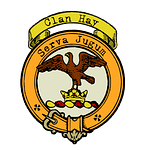Welcome back to "A Clan A Day Podcast," brought to you by bagtownclans.com. I'm your host, Colin MacDonald. Today, we’re delving into the history of Clan Mercer, a family whose name is synonymous with commerce, courage, and cultural contributions. With roots in medieval Scotland, the Mercers left a significant mark not just in their homeland but across the wider world.
The Mercer name derives from the Old French word mercier, meaning merchant. It first appears in Scottish records in the 12th century, notably when a William Mercer witnessed charters for Kelso Abbey. This surname points to their origins as merchants in textiles and fine goods, but the Mercers quickly rose beyond trade to become landowners, warriors, poets, and diplomats.
The Mercers divided into two primary branches: the Mercers of Innerpeffry, or the Roys (Reds), and the Mercers of Aldie, known as the Dhus (Blacks). While both branches contributed to the clan’s storied history, the Innerpeffry line is regarded as the elder.
The Innerpeffry Mercers established themselves in Strathearn by intermarrying with the family of Malcolm de Innerpeffry, sheriff of Clackmannan in the early 14th century. By the late 1400s, the Mercers were embroiled in a protracted dispute over their lands, particularly with the Oliphants, who had purchased Innerpeffry. David Mercer and his five sons waged legal and physical battles to reclaim their ancestral lands, even occupying Lord Oliphant’s territory of Clathy. Though their hold on Innerpeffry faltered over time, they retained a presence in royal circles, with members like William Mercer serving King James IV and gaining recognition as a poet. This William may even have been the Mercer lamented by William Dunbar in his famous Lament for the Makars.
The Mercers of Aldie, meanwhile, were closely tied to the city of Perth, a thriving medieval hub. A saying of the time declared, “The Mercers aye are older than old Perth,” emphasizing their long-standing prominence in the region. John Mercer, a wealthy merchant and diplomat, exemplified the clan’s stature in the 14th century. As provost of Perth and commissioner for the town, he represented Scotland abroad, notably in negotiations for the ransom of King David II. John’s wealth and influence extended to Europe, earning him the respect of the French court.
John’s son, Sir Andrew Mercer, epitomized the boldness of the family. When John was captured by the English during a truce in 1377, Andrew assembled a private fleet of Scots, French, and Spanish ships to avenge his father. He raided English ships off the coast of Scarborough, capturing several vessels and securing his family’s fame. This daring maritime exploit gave rise to the Mercer motto, "Ye gret pule," or “The great pool,” a reference to the sea.
The Mercers were not only adventurers but also landowners and patrons of culture. Sir Andrew of Aldie expanded the family’s holdings, acquiring estates like Meikleour and Kilgraston. His descendants played roles in royal courts and governance, while others, like Major James Mercer, made their mark in the arts. Major Mercer, a friend of poet James Beattie, was an accomplished poet in his own right, blending a military career with intellectual pursuits.
Among the most notable members of Clan Mercer was Hugh Mercer, who emigrated to America in the 18th century. Originally trained as a physician, Hugh became a hero of the American Revolutionary War. Serving alongside George Washington, he distinguished himself in battles such as Trenton and Princeton. Tragically, he died in 1777 from injuries sustained at Princeton, where he had led the American vanguard. Washington himself mourned the loss, and Hugh’s legacy endures as a symbol of bravery and leadership.
The Mercer crest—a crane crushing a serpent—reflects the vigilance and determination that defined the clan. Their war cry, "Ye gret pule," is a reminder of their maritime heroics and their ability to navigate turbulent waters, both literal and metaphorical.
The Mercers’ influence extended beyond Scotland. In the 19th century, George Mercer of Gorthy played a pivotal role in the colonization of Port Phillip, now part of Victoria, Australia. As an agent for the Geelong and Dutigalla Association, he negotiated treaties with Aboriginal leaders and advocated for land rights, leaving a complex and lasting legacy.
Today, the Mercer name is still associated with its historical roots in Perth and Strathearn. The family’s contributions to Scotland’s political, cultural, and military heritage endure as a testament to their resilience and ambition.
Thank you for joining us on today’s exploration of Clan Mercer. Be sure to tune in tomorrow for another episode of "A Clan A Day Podcast." I’m Colin MacDonald, and as always, Go n-éirí an bóthar leat.











